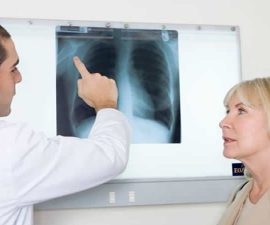When it comes to discussing about the cause of emphysema (a chronic, incurable obstructive lung disease), smoking is often to blame. In fact, most patients with the disease are associated with smoking – though there are also many smokers who don’t develop it. Interestingly, some conditions that you’re born with may also contribute to cause the problem. So are you born with emphysema? The following are main topics associated with this issue.
CLE (congenital lobar emphysema)
CLE is a rare respiratory condition in which the air in the lungs cannot be normally exhaled, causing hyperinflation in the lung’s lobes and making it more difficult to breathe. It is usually diagnosed in newborns, though in less severe cases it can also occur in young infants or may not appear until childhood.
The impact of the disease on the lung function can vary. But it can be severe enough to increase the risk of heart problems, though sometimes it is mild and doesn’t cause serious symptom.
The cause of the disease is difficult to understand. Many times, it is not clearly identified (sporadic), but in some cases it may be linked to autosomal dominant inheritance.
In general, it is divided into two types:
- Polyalveola (a condition in which there is greater than expected number of air sacs ‘alveoli’).
- And hypoalveolar (fewer than expected /normal number of alveoli).
It almost always affects one lobe of the lung, and the rate of the occurrence is as follows:
- About 21 percent (right upper lobe).
- 34 percent (right middle lobe).
- And 41 percent (left upper lobe).
Emphysema associated with premature birth
Premature birth is a condition in which a birth occurs earlier than normal. Normal pregnancies last about 40 weeks. But in premature birth, the pregnancy lasts shorter – the birth occurs before the 37th week of pregnancy.
There are a number of conditions that can contribute to lead to premature birth. The common ones include:
- Uncontrolled gestational diabetes.
- Uncontrolled chronic conditions such as hypertension.
- Stressful events.
- Physical trauma or injury.
- Pregnancy with multiples.
- Poor nutrition.
- Not gaining enough pregnancy weight gain.
Babies with premature birth are at high risk of particular health conditions. One of them may be emphysema.
One study published in ERJ (the European Respiratory Journal) showed that about eight out of 10 people born with premature birth had symptoms of emphysema. This study observed 21 women and men born up to 4 months premature. Many of them had lung problems, particularly after a lifetime of smoking. About 75 percent of them had abnormal /poor lung function – and 84 percent had symptoms of emphysema.
The improvements in the care of babies with premature birth over the past years give a significant impact on the rate of those who survive a premature birth. But this may also slightly increase the number of people suffering lung problems.
Overall, this study suggests that smoking is very bad for the lung function since again it is the leading risk factor of emphysema, particularly true for people with a history of ‘premature’ birth.
Alpha-1 Antitrypsin (AAT) deficiency
In a few cases, emphysema is linked to alpha-1 antitrypsin deficiency (an inherited condition). As the name suggests, this genetic disorder is a condition in which there is lack of a kind of protein called alpha-1 antitrypsin or AAT.
AAT is essential to help protect the lungs. Without adequate AAT in the blood, the lungs are more susceptible to being damaged. Therefore, the deficiency of this protein can increase the risk of some lung conditions such as emphysema. Smoking can worsen this risk!
Older age is one of the main risk factors of emphysema and other types of chronic obstructive pulmonary disease. But COPD due to AAT deficiency is often diagnosed earlier in life, such as at the age of 40 or younger. The good news, this deficiency is not common (rare).
People with emphysema linked to AAT deficiency are also likely to:




